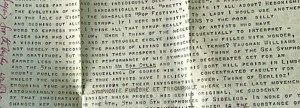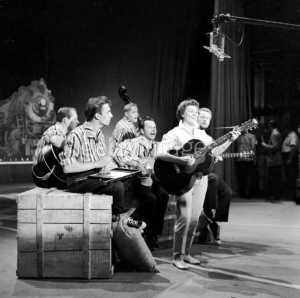 Found – a typed signed letter from Alan Denson*— Irish poet and writer (he wrote a book on the Irish sculptor John Hughes and edited the letters of AE and wrote about ‘Speranza’ -Lady Wilde – Oscar Wilde’s mother.)
Found – a typed signed letter from Alan Denson*— Irish poet and writer (he wrote a book on the Irish sculptor John Hughes and edited the letters of AE and wrote about ‘Speranza’ -Lady Wilde – Oscar Wilde’s mother.)
The recipient was Beatrice Elvery, Lady Glenavy (1881 – 1970). Irish artist and literary host, friend of Katherine Mansfield and in the circle of Shaw, Lawrence and Yeats. She modelled for Orpen and painted ‘Éire’ (1907) a landmark painting promoting the idea of an independent Irish state. She married Charles Henry Gordon Campbell, 2nd Baron Glenavy (1885–1963) politician and banker in England and Ireland. The letter gives a damning contemporary view of pop music and Dylan from someone who was probably in his early 40s at the time..now his views could be considered blasphemous!
The wonder is I have managed to contain my raging fury at contemporary humbug–which goes far more and more insidiously deep than is generally recognized – and the evil vision what I sarcastically call “pretty values.” A recent example over in the Isle of Wight— the so-called “pop festival.” What’s it all about? Hedonism: and dishing out alleged syrup. If I were not writing to a lady I would use another word to express what I think all that syrup really means to the poor silly saps who lap it up. When I think of the neglect of artists who have a vision of the world and by struggle evolve images sequentially to interpret – not merely to record– the phases of living experience, I’m filled with wonder, and gratitude. But who among them prosper in commercial terms? Vaughan Williams earns less by the public performance of his symphonies than Mr. Bob Dylan and the pop degenerates get for an hours public sporadic squealing. Of course him and his sort will perish in Limbo whilst the works of the true artists have, I believe, a concentrated faculty for enduring time without erosion of their invigorating power. Think of Berlioz’s astoundingly original ’Symphonie Funebre et Triomphale’ where in the last movement by that imaginative in sight which proved his genius original, he suddenly changes key upward: or the fourth, fifth and sixth symphonies of Sibelius. In none of those works I’ve named is there any shade of sentimentality, which is the substance of so called ”pop” and that equally phony “folk art” – I’ll forbear and omit rude language. [12/9/1969 Alan Denson to Lady Beatrice Glenavy from Kendal, Westmorland]
*Unknown so far to Wikipedia, possible dates 1930-2012, the only substantial info on him is at Amazon in a review of his poems by an old friend.

